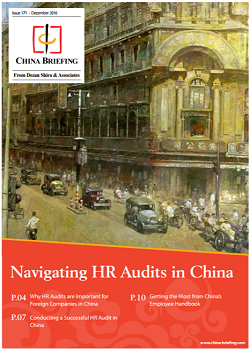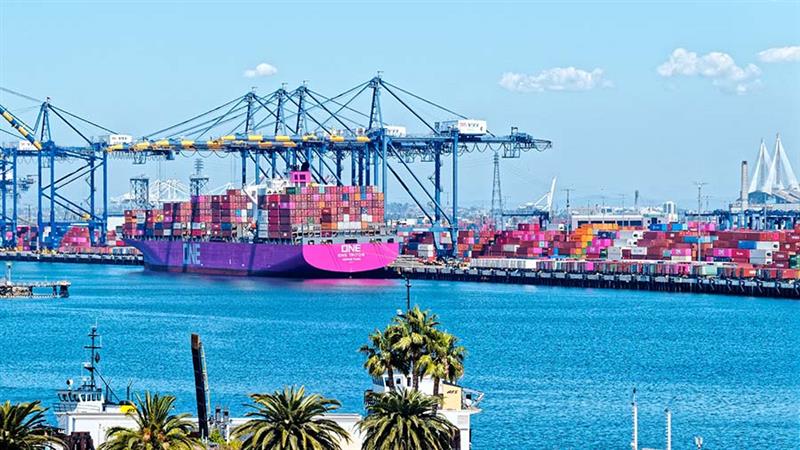Understanding China’s Lifted Regulation for e-Commerce WFOEs Operating in Free Trade Zones
By Tongyu Zhang
In June 2015, the Ministry of Industry and Information Technology (MIIT) published the Notice on Removing Restriction on Foreign Equity Ratios in Online Data Processing and Transaction Processing Business (Operating e-commerce), which allows foreign investors to hold up to 100 percent equity in an e-commerce company. However, it was not until one year later that the first wholly foreign-owned enterprise (WFOE), Heiwado (China) Co., Ltd, a Japanese company, obtained an operational internet content provider (ICP) license from the MIIT. While the Chinese government provides considerable policy support to the e-commerce sector, the specific definition of e-commerce is vague and can lead to a series of problems in practice. For instance, relevant authorities hold a more reluctant attitude towards e-commerce for services than towards commodities transactions.
The e-commerce business model is composed of retailing e-commerce and platform e-commerce. The former indicates a company selling its own goods through its own website, while the latter is an enterprise that uses its own online platform to provide network services to third parties. According to the Ministry of Commerce (MOFCOM), a foreign-invested enterprise providing platform e-commerce services must obtain an ICP License from the MIIT, as such service belongs to online data and transaction processing services of Category I Valued-added Telecommunications Services.
Review of the application requirements in Shanghai
According to a recent research conducted by Dezan Shira & Associates’ Business Advisory Service team, currently, in Shanghai, only WFOEs registered in Free Trade Zone (FTZ) can apply for an ICP license and conduct e-commerce business.
The approval authority of the ICP license is the MIIT and the Shanghai Communications Administration Bureau. If a WFOE registers in the original areas of the Shanghai FTZ (Pudong airport, Waigaoqiao bonded area, Waigaoqiao bonded logistics park and Yangshan port), it is eligible to apply for an ICP license with the Shanghai Communications Administration Bureau. If located elsewhere, it should apply with the State Ministry of Industry and Information Technology. Note that it is not mandatory for a WFOE to apply for an ICP license before formal registration. The license can be applied for after receiving the business license.
![]() RELATED: Business Advisory Services from Dezan Shira & Associates
RELATED: Business Advisory Services from Dezan Shira & Associates
In addition to this, the following criteria shall be fulfilled by the WFOE:
- A minimal registered capital of RMB 1 million;
- Server(s) located in the FTZ;
- Experience in the e-commerce field; and,
- If products intended to be sold via the platform require special vending licenses (such as medications), they should be obtained accordingly.
Comprehensive pilot zones for cross-border e-commerce
Other than the FTZs, the Chinese government has also set up 13 comprehensive pilot zones for cross-border e-commerce, including Hangzhou, Tianjin, Shanghai, Chongqing, Hefei, Zhengzhou, Guangzhou, Chengdu, Dalian, Ningbo, Qingdao, Shenzhen, and Suzhou. In general, by experimenting with new models for technical standards, business procedures and regulatory mechanisms, these pilot zones aim to promote e-commerce nationally. Some critical stages in the process of foreign-invested e-commerce business, such as payment, logistics, customs clearance, tax refund and foreign exchanges, may also benefit from operation of these pilot zones. In addition, each of the pilot zones have their own regional advantages. For example, Zhengzhou is an important transportation hub in the central-eastern part of China, and plays a key role in the ‘One Belt One Road’ strategy. On the other hand, Dalian enjoys more cross-border e-commerce trade with Japan and South Korea due to the city’s proximity.
Key takeaways
Like in many other industries, state policies on e-commerce may come into conflict with the practices of local authorities. Sometimes, these issues can be highly complicated due to the involvement of several different governing authorities and policies, particularly in the cases of FTZs, pilot zones and high-tech parks. Although, theoretically, restrictions on WFOEs involved in e-commerce business has been lightened, it is still difficult for WFOEs to obtain the relevant license. The Chinese government gradually implements new policies by first experimenting in pilot zones; therefore, foreign investors, especially WFOEs, should keep in close contact with the local government, and seek opinions from experienced professionals.
|
Asia Briefing Ltd. is a subsidiary of Dezan Shira & Associates. Dezan Shira is a specialist foreign direct investment practice, providing corporate establishment, business advisory, tax advisory and compliance, accounting, payroll, due diligence and financial review services to multinationals investing in China, Hong Kong, India, Vietnam, Singapore and the rest of ASEAN. For further information, please email china@dezshira.com or visit www.dezshira.com. Stay up to date with the latest business and investment trends in Asia by subscribing to our complimentary update service featuring news, commentary and regulatory insight.
|

 Dezan Shira & Associates Brochure
Dezan Shira & Associates Brochure
Dezan Shira & Associates is a pan-Asia, multi-disciplinary professional services firm, providing legal, tax and operational advisory to international corporate investors. Operational throughout China, ASEAN and India, our mission is to guide foreign companies through Asia’s complex regulatory environment and assist them with all aspects of establishing, maintaining and growing their business operations in the region. This brochure provides an overview of the services and expertise Dezan Shira & Associates can provide.
 An Introduction to Doing Business in China 2017
An Introduction to Doing Business in China 2017
Doing Business in China 2017 is designed to introduce the fundamentals of investing in China. Compiled by the professionals at Dezan Shira & Associates in January 2017, this comprehensive guide is ideal not only for businesses looking to enter the Chinese market, but also for companies who already have a presence here and want to keep up-to-date with the most recent and relevant policy changes.
 Navigating HR Audits in China
Navigating HR Audits in China
Recent changes in China’s labor market have underscored the importance of having both an efficient HR system and a satisfied and reliable workforce, and the HR audit is a useful tool to ensure this. In this issue of China Briefing magazine, we provide a guide for conducting HR audits in China. We analyze why the HR audit is especially important for foreign companies operating in the country, and then detail the different HR audit models and procedures that are available to firms.
- Previous Article The BEPS Action Plan in China and Hong Kong: Impact Assessment for Foreign Enterprises
- Next Article Asia Investment Brief: FDI Opportunities in Laos, Tax Residency in India, and RO Establishment in Indonesia



























